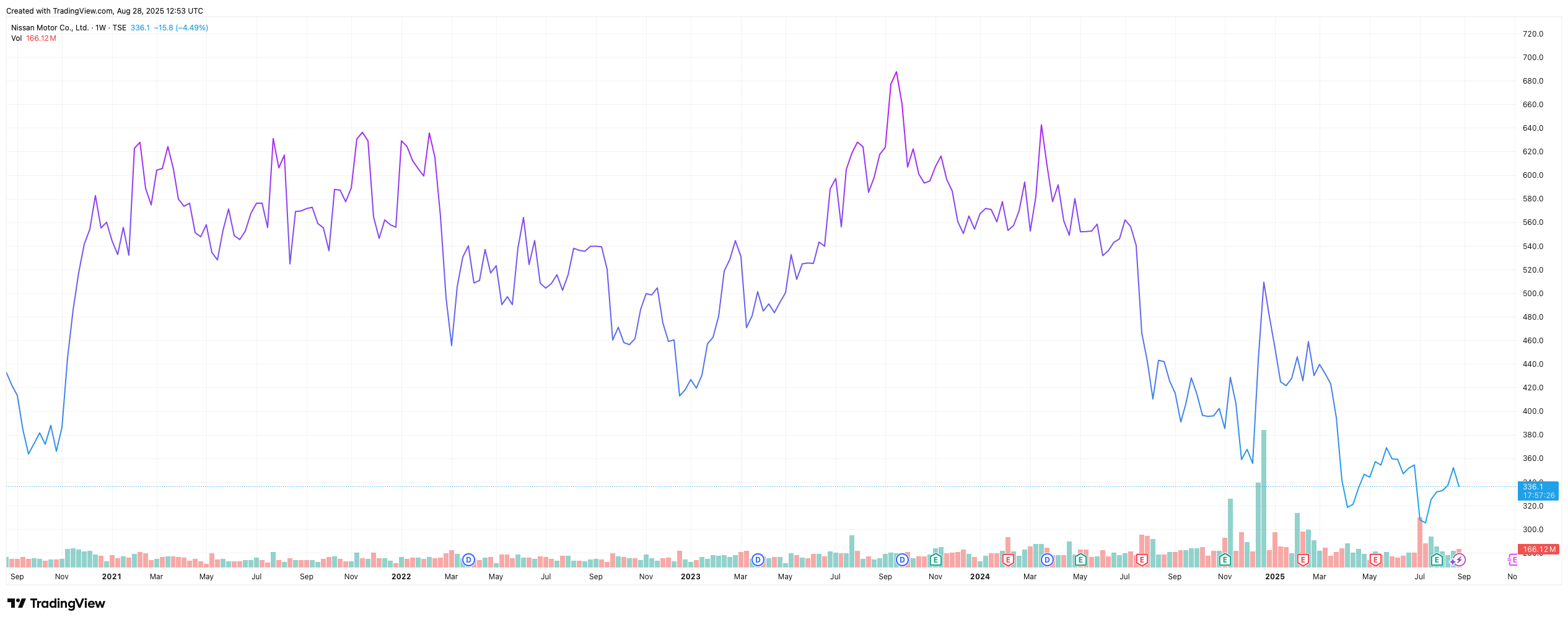About the company
Nissan Motor Corporation is a Japanese company primarily engaged in the manufacturing and sale of automobiles and spare parts, as well as providing financial services in sales. The company operates in two business segments. The automotive segment, which is involved in the production and sale of electric vehicles, compact cars, light vehicles, minivans, commercial vehicles, trucks, minibuses, and other automobiles, as well as related parts. The sales financing segment deals with sales financing and leasing to support sales activities in the automotive industry.[1]
Concerns about restructuring
According to The News Agency of the Slovak Republic, the sale of shares indicates investors’ concerns about the prospects of the restructuring plan, or legally mandated corporate rehabilitation, and lower sales volumes. As a result, Nissan is expected to shut down production at some plants in the Land of the Rising Sun and abroad in order to cut costs and restore profitability. [2] The third-largest car manufacturer in Japan, Nissan Motor, is also battling tariffs imposed by the United States.[3] The automaker also faces the transition to electric vehicles amid strong global competition, especially from Chinese rivals.[4]
Stock performance
According to data from the global financial markets provider London Stock Exchange Group, Mercedes was Nissan’s second-largest shareholder after French carmaker Renault, with a 35.7 percent stake.[5] The price of Nissan’s secondary share sale was set at 341.3 yen (1.98 euros) per share, representing a 5.98 percent discount compared to the price of 363 JPY per share at the close of trading on the Tokyo Stock Exchange on Monday, the London agency specified.3 Nissan’s share price has fallen by more than 28 percent since the beginning of this year.[6], [7]

Performance of Nissan shares over 5 years. Source of chart: Google Finance*
Pressure on the share price of the Japanese carmaker increased, with shares closing on Tuesday down by more than 5 percent.*[8] A Mercedes spokesperson announced the sale on Monday, adding that the shares in Nissan, which had been transferred to pension assets in 2016, were not of strategic importance, and the sale was described as part of portfolio cleansing. The stake of Mercedes-Benz Pension Trust in Nissan accounts for 2.7 percent of Mercedes’ total holdings, while almost 93 percent is owned by German truck and bus maker Daimler Truck.1
Historical events
At the end of last year, Nissan began short-term talks with Japan’s Honda, which is, for example, the world’s largest motorcycle manufacturer, about potential cooperation to create the world’s third-largest carmaker, but the negotiations ended unsuccessfully in February.[9] In May, Nissan announced plans to cut 11,000 jobs and close seven plants. 3, [10] In June, Nissan’s CEO Ivan Espinosa stated that the company’s short-term goal is to fix the situation of the carmaker, which is undergoing extensive restructuring.3, [11] In July, tariffs on carmakers were reduced to 15 percent from the original 25 percent, which meant some relief for Japanese carmakers. The original tariff was cut in half to 12.5 percent, and then an additional most-favored-nation base tariff of 2.5 percent was added.[12]
* Past performance is not a guarantee of future results.
[1] https://www.cnbc.com/quotes/NSANY
[2] https://www.teraz.sk/najnovsie/dochodkovy-fond-mercedes-benz-pension/901876-clanok.html
[6] https://www.google.com/finance/quote/7201:TYO
[7] https://tradingeconomics.com/7201:jp
[10] https://global.nissannews.com/en/releases/250513-02-e
[11] https://www.cnbc.com/2025/06/04/nissan-ceo-says-short-term-focus-is-to-fix-our-company.html
[12] https://www.cnbc.com/2025/07/23/stocks-of-japan-automakers-soars-after-us-lowers-auto-tariffs.html



